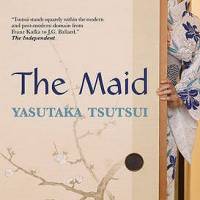In Japan, true feelings (known as honne) are often hidden behind the mask of a false front (tatemae). So the comic potential of a mind-reading maid working in private family homes — encountering sexual frustrations, jealousy and the mutual resentment of parents and their children — sounds rich indeed.
The Maid, by Yasutaka Tsutsui, Translated by Adam Kabat.
217 pages
Alma, Fiction.
Yasutaka Tsutsui's picaresque 1972 novel, "The Maid," offers a social panorama of Japan in the early '70s, but many of the stock characters still ring true today: philandering salarymen; obsessive, conceited academics; and self-indulgent, vaguely absurd artists. More dated is the virginal, bland female protagonist who is cast adrift in a sea of male chauvinism. She constantly finds herself threatened with rape from her employers and must to turn her telepathic powers against them in order to escape.
It is slightly disappointing that the novel has little narrative arc as we are distanced from the interior life and development of the heroine. Also, it's not always instantly clear whose thoughts are being read (Japanese reveals the gender of characters through speech easier than English).
However, the correlation between the author — himself capable of "telepathic" insight into the minds of his characters and dispatching them to madness or grim death — and the maid who wreaks havoc in the lives of those whose minds she enters, is a fascinating one.
"The Maid" is an interesting snapshot of the period, but ultimately promises more than it delivers.
Read archived reviews of Japanese classics at jtimes.jp/essential.

















With your current subscription plan you can comment on stories. However, before writing your first comment, please create a display name in the Profile section of your subscriber account page.